The natural world abounds with fascinating animals, and many wander into books for young people. Here we feature fiction and nonfiction titles where animals are the main focus or play an important supporting role. Whether they are cuddly and adorable or a reminder of the wildness of nature, animals of all sorts intrigue those of us who walk upright.
Ages 4–8
A Beetle Is Shy. Dianna Hutts Aston. Ill. Sylvia Long. 2016. Chronicle.
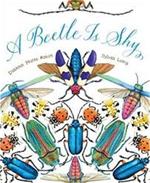 This excellent writer–illustrator team uses their sixth title to highlight the seemingly infinite variety of beetles and the characteristics and behaviors that make them so interesting. Sticking to the pattern used in their earlier nature-themed books, A Beetle Is Shy begins by identifying one attribute of beetles—shyness—before covering several other attributes of beetles, and then circling back to the declaration that while some beetles are shy, others are quite bold. Well-chosen words describe various beetles and their life cycles, and acknowledge they can both help and harm. Young readers are sure to be intrigued to learn about places where beetles serve as a food source for humans. The extraordinarily detailed watercolor illustrations perfectly complement the text, placing readers into the beetles’ interesting world. Particularly noteworthy is one illustration showing the North American Featherwing Beetle next to a needle and thread, a terrific depiction of size when compared to an ordinary household object since this beetle is so tiny. A double-page spread at the end of the book features 28 beetles whose sometimes drab, sometimes iridescent colors not only highlight their differences but provide evidence of Mother Nature’s fondness for her own jewels.
This excellent writer–illustrator team uses their sixth title to highlight the seemingly infinite variety of beetles and the characteristics and behaviors that make them so interesting. Sticking to the pattern used in their earlier nature-themed books, A Beetle Is Shy begins by identifying one attribute of beetles—shyness—before covering several other attributes of beetles, and then circling back to the declaration that while some beetles are shy, others are quite bold. Well-chosen words describe various beetles and their life cycles, and acknowledge they can both help and harm. Young readers are sure to be intrigued to learn about places where beetles serve as a food source for humans. The extraordinarily detailed watercolor illustrations perfectly complement the text, placing readers into the beetles’ interesting world. Particularly noteworthy is one illustration showing the North American Featherwing Beetle next to a needle and thread, a terrific depiction of size when compared to an ordinary household object since this beetle is so tiny. A double-page spread at the end of the book features 28 beetles whose sometimes drab, sometimes iridescent colors not only highlight their differences but provide evidence of Mother Nature’s fondness for her own jewels.
Cat Nap. Toni Yuly. 2016. Feiwel & Friends.
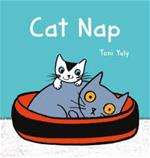 Young cat-lovers will readily relate to this color-drenched picture book with its depiction of the behavioral differences between a kitten eager for play and an older, sedate cat—quite possibly mirroring the differences between the behavior of adult humans and toddlers. While Cat clings to his daily routine, filled with plenty of naps, Kitten simply wants a playmate. The wily Cat tolerates the upstart’s attention before suggesting they play a hiding game, but Cat only hides briefly before Kitten finds him. Quickly growing weary of the game and Kitten’s attention, Cat heads off for a well-deserved nap, only to find that Kitten has chosen his preferred napping place as a bed. This adorable read-aloud offers plenty of interesting visuals and text to hold the attention of young children before naptime.
Young cat-lovers will readily relate to this color-drenched picture book with its depiction of the behavioral differences between a kitten eager for play and an older, sedate cat—quite possibly mirroring the differences between the behavior of adult humans and toddlers. While Cat clings to his daily routine, filled with plenty of naps, Kitten simply wants a playmate. The wily Cat tolerates the upstart’s attention before suggesting they play a hiding game, but Cat only hides briefly before Kitten finds him. Quickly growing weary of the game and Kitten’s attention, Cat heads off for a well-deserved nap, only to find that Kitten has chosen his preferred napping place as a bed. This adorable read-aloud offers plenty of interesting visuals and text to hold the attention of young children before naptime.
Ages 9–11
Bad Kitty Goes to the Vet. Nick Bruel. 2016. Roaring Brook.
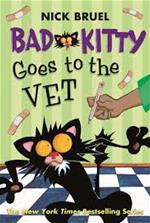 Anyone who has tried to wrangle a cat into its carrier for a trip to the vet knows this story. There's just something about an impending trip to the doctor that causes many cats, including Kitty, to freak out and head for parts unknown or to lash out viciously. The book's cover foretells the plot: It features an illustration of Kitty, fur bristling, tail pointed skyward, and eyes bulging as a hand with a thermometer approaches and bandages fly through the air. Poor Kitty has lost her appetite, which prompts her human companion to schedule a trip to the veterinarian. Readers will laugh at the collection of protective equipment gathered to get her into the carrier, including padding, duct tape, and even a welding mask. After her appointment, Kitty dreams of her future if she doesn't change her behavior toward Puppy, her constant, seemingly clueless victim. Filled with humorous illustrations depicting Kitty at her best and her worst, the book also weaves in interesting information about veterinarians and pet care. Although there is sweetness kneaded into the storyline, Bad Kitty doesn't disappoint fans as she reverts to normal Bad Kitty behavior. Anyone who needs a pick-me-up will enjoy this book, filled as it is with snarky humor and a cat that lovingly epitomizes the worst in feline behavior.
Anyone who has tried to wrangle a cat into its carrier for a trip to the vet knows this story. There's just something about an impending trip to the doctor that causes many cats, including Kitty, to freak out and head for parts unknown or to lash out viciously. The book's cover foretells the plot: It features an illustration of Kitty, fur bristling, tail pointed skyward, and eyes bulging as a hand with a thermometer approaches and bandages fly through the air. Poor Kitty has lost her appetite, which prompts her human companion to schedule a trip to the veterinarian. Readers will laugh at the collection of protective equipment gathered to get her into the carrier, including padding, duct tape, and even a welding mask. After her appointment, Kitty dreams of her future if she doesn't change her behavior toward Puppy, her constant, seemingly clueless victim. Filled with humorous illustrations depicting Kitty at her best and her worst, the book also weaves in interesting information about veterinarians and pet care. Although there is sweetness kneaded into the storyline, Bad Kitty doesn't disappoint fans as she reverts to normal Bad Kitty behavior. Anyone who needs a pick-me-up will enjoy this book, filled as it is with snarky humor and a cat that lovingly epitomizes the worst in feline behavior.
Fabulous Frogs. Martin Jenkins. Ill. Tim Hopgood. 2016. Candlewick.
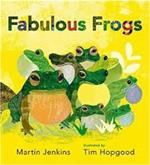 Although most of us will never see more than a handful of them, there are more than 5,000 species of frogs in the natural world. Beginning with the enormous Goliath frog and concluding with the intriguing Australian water-holding frog and one common frog that most readers are sure to recognize, this book presents plenty of interesting information about these amphibians. An index encourages readers to revisit the text to think more deeply about how frogs breathe, the sounds they make, and other characteristics and behaviors. This well-designed celebration of frogs, with its lively text and stunning mixed-media illustrations, will make readers wish there were even more frogs on its pages. Even the endpapers feature tadpoles and egg tape strips. Fabulous Frogs will appeal to anyone interested in frogs but will also kindle interest in others, who will find the information hard to resist. As a passionate introduction to frogs, the book will intrigue young readers while avoiding overwhelming them with too many details.
Although most of us will never see more than a handful of them, there are more than 5,000 species of frogs in the natural world. Beginning with the enormous Goliath frog and concluding with the intriguing Australian water-holding frog and one common frog that most readers are sure to recognize, this book presents plenty of interesting information about these amphibians. An index encourages readers to revisit the text to think more deeply about how frogs breathe, the sounds they make, and other characteristics and behaviors. This well-designed celebration of frogs, with its lively text and stunning mixed-media illustrations, will make readers wish there were even more frogs on its pages. Even the endpapers feature tadpoles and egg tape strips. Fabulous Frogs will appeal to anyone interested in frogs but will also kindle interest in others, who will find the information hard to resist. As a passionate introduction to frogs, the book will intrigue young readers while avoiding overwhelming them with too many details.
Lucky. Chris Hill. 2016. Chicken House/Scholastic.
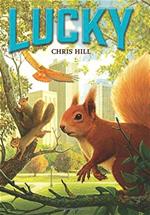 In the tradition of the well-loved Redwall series, this chapter book follows the adventures of Lucky, a red squirrel who has been separated from others like him. Instead, he finds himself surrounded by large gray squirrels in unfamiliar terrain in Albion Park. Fortunately, First Daughter befriends him, and Lucky becomes fast friends with the athletically-gifted Nimlet. To Lucky’s dismay, the gray squirrels are engaged in plots of intrigue and political posturing, and he becomes caught up in the conflict between the Northender squirrels and the Cloudfoots. Readers will enjoy the resemblance to humans borne by different characters in the story, populated as it is with villains, a slightly-ditsy heroine who ends up saving the day, and unexpected sources of betrayal. The antics of the neighborhood dogs and a fox add humor to this story that will leave readers chittering for more.
In the tradition of the well-loved Redwall series, this chapter book follows the adventures of Lucky, a red squirrel who has been separated from others like him. Instead, he finds himself surrounded by large gray squirrels in unfamiliar terrain in Albion Park. Fortunately, First Daughter befriends him, and Lucky becomes fast friends with the athletically-gifted Nimlet. To Lucky’s dismay, the gray squirrels are engaged in plots of intrigue and political posturing, and he becomes caught up in the conflict between the Northender squirrels and the Cloudfoots. Readers will enjoy the resemblance to humans borne by different characters in the story, populated as it is with villains, a slightly-ditsy heroine who ends up saving the day, and unexpected sources of betrayal. The antics of the neighborhood dogs and a fox add humor to this story that will leave readers chittering for more.
Prairie Dog Song: The Key to Saving North America’s Grasslands. Susan L. Roth & Cindy Trumbore. Ill. Susan L. Roth. 2016. Lee & Low.
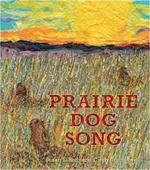 History is filled with periods when humans have carelessly destroyed the environment, subsequently threatening the existence of the animals that depend on certain habitats to survive. An excellent reminder of what happens when certain species are removed from their habitats, this book describes how the intrusion of humans on prairie grasslands and deserts of North America caused many native flora and fauna to disappear. Decades after this loss, a scientist happens upon an area in Mexico where the grasslands still thrive. He comes to realize the importance of a keystone species such as prairie dogs. The book tells the story of this special area, now preserved and populated with species that thrive there, through "Prairie Dog Song," a song about what happened, and additional text that expands on the events described in the song. The stunning illustrations, created in paper and fabric collage, are filled with thousands of paper strips representing the prairie grass. This book would be a great introduction to a unit about the interconnection of species and serves as a cautionary tale for those who support the eradication of wolves and other species. As often as humans lay waste to the world around them, they can also heal its wounds.
History is filled with periods when humans have carelessly destroyed the environment, subsequently threatening the existence of the animals that depend on certain habitats to survive. An excellent reminder of what happens when certain species are removed from their habitats, this book describes how the intrusion of humans on prairie grasslands and deserts of North America caused many native flora and fauna to disappear. Decades after this loss, a scientist happens upon an area in Mexico where the grasslands still thrive. He comes to realize the importance of a keystone species such as prairie dogs. The book tells the story of this special area, now preserved and populated with species that thrive there, through "Prairie Dog Song," a song about what happened, and additional text that expands on the events described in the song. The stunning illustrations, created in paper and fabric collage, are filled with thousands of paper strips representing the prairie grass. This book would be a great introduction to a unit about the interconnection of species and serves as a cautionary tale for those who support the eradication of wolves and other species. As often as humans lay waste to the world around them, they can also heal its wounds.
Ages 12–14
Maybe a Fox. Kathi Appelt & Alison McGhee. 2016.Caitlyn Dlouhy/Atheneum/Simon & Schuster.
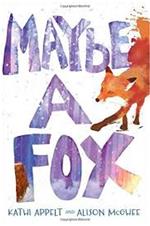 Jules and her older sister Sylvie are very close and enjoy living on their rural New England property with their father and spending time with their friend Sam. While Sylvie races through life, inspired by the speed of Florence Griffith-Joyner, Jules loves rocks and spends hours sorting and categorizing them. When Sylvie disappears one day while running through the woods, the family is devastated. But Senna, a young red fox, watches over Jules and leads her to the truth about her sister. Loss is threaded through this book as each of the characters is coping with grief and the absence of loved ones. For instance, Elk, Sam's older brother, has returned safely from Afghanistan, but without his best friend Zeke. In the end, the characters find comfort in the realization they have one another and the knowledge that those who left them mattered and are still with them in some way. The sound of one farmer’s continuously blasting gun foreshadows the book's conclusion.
Jules and her older sister Sylvie are very close and enjoy living on their rural New England property with their father and spending time with their friend Sam. While Sylvie races through life, inspired by the speed of Florence Griffith-Joyner, Jules loves rocks and spends hours sorting and categorizing them. When Sylvie disappears one day while running through the woods, the family is devastated. But Senna, a young red fox, watches over Jules and leads her to the truth about her sister. Loss is threaded through this book as each of the characters is coping with grief and the absence of loved ones. For instance, Elk, Sam's older brother, has returned safely from Afghanistan, but without his best friend Zeke. In the end, the characters find comfort in the realization they have one another and the knowledge that those who left them mattered and are still with them in some way. The sound of one farmer’s continuously blasting gun foreshadows the book's conclusion.
Terror at Bottle Creek. Watt Key. 2016. Farrar, Straus & Giroux.
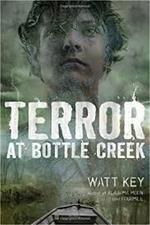 Thirteen-year-old Cort has had it with both of his parents. After his mother wants nothing to do with his father because she’s fed up with the rural lifestyle that comes with being married to an Alabama swamp guide, his father still has hopes she’ll come back to him. As the town prepares for an impending hurricane, Cort and the two Stovall girls are separated from the adults. They head into the swamp in order to stay as safe as they possibly can from Hurricane Igor, a category three hurricane that causes storm surges and makes it impossible for them to return to the safety of the Stovall house. Not surprisingly, as the youngsters seek higher ground among the area's mounds and trees, other species have the same idea, and they end up competing for sanctuary with wild hogs, a bear, snakes, and alligators. The book is fast-paced, filled with plenty of action, and features a never-say-die protagonist whose fears and heroics are quite believable. Readers will come to realize that sometimes the decisions made under pressure may not be sound ones but seem to be the only options. The author effectively captures the sights, sounds, and smells associated with a hurricane as well as the efforts citizens make to keep their property safe. Readers will worry no one will leave that swamp alive since all of the characters come far too close to nature.
Thirteen-year-old Cort has had it with both of his parents. After his mother wants nothing to do with his father because she’s fed up with the rural lifestyle that comes with being married to an Alabama swamp guide, his father still has hopes she’ll come back to him. As the town prepares for an impending hurricane, Cort and the two Stovall girls are separated from the adults. They head into the swamp in order to stay as safe as they possibly can from Hurricane Igor, a category three hurricane that causes storm surges and makes it impossible for them to return to the safety of the Stovall house. Not surprisingly, as the youngsters seek higher ground among the area's mounds and trees, other species have the same idea, and they end up competing for sanctuary with wild hogs, a bear, snakes, and alligators. The book is fast-paced, filled with plenty of action, and features a never-say-die protagonist whose fears and heroics are quite believable. Readers will come to realize that sometimes the decisions made under pressure may not be sound ones but seem to be the only options. The author effectively captures the sights, sounds, and smells associated with a hurricane as well as the efforts citizens make to keep their property safe. Readers will worry no one will leave that swamp alive since all of the characters come far too close to nature.
Ages 15+
The Killing Jar. Jennifer Bosworth. 2016. Farrar, Straus & Giroux.
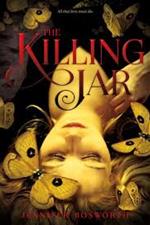 Seventeen-year-old Kenna Marsden has unusual and somewhat frightening gifts that she has never harnessed. Several years ago, with only a touch, she killed a boy who had tortured and killed her sister's cat and its kittens. Since then, she has kept this ability a secret. But when her twin sister and mother are assaulted and killed after her performance at a folk music festival, her special powers awaken again, and she revives her family members. Unsure what to do with Kenna, her mother sends her off to Eclipse, a local commune where she can learn how to make the most of her powers. Despite how comfortable she feels with others like her, including the grandmother she never knew existed, Kenna remains wary and curious about their strong connection with moths. When she eventually learns the secret behind the attractiveness and youthfulness of those who live in the commune, she is understandably horrified. Teen readers will appreciate Kenna’s dilemma as she vacillates between her strong feelings for Blake, the kind-hearted boy next door at home, and for Cyrus, who gently teaches her about her heritage at the commune. The passages in which Kenna explores and then learns to rein in her powers as well as her struggles with the alluring nature of a blissed-out life are particularly well-written. It’s interesting to ponder how an entire society exists right below the surface of Kenna’s mundane one and speculate about what started all the moth-worshipping.
Seventeen-year-old Kenna Marsden has unusual and somewhat frightening gifts that she has never harnessed. Several years ago, with only a touch, she killed a boy who had tortured and killed her sister's cat and its kittens. Since then, she has kept this ability a secret. But when her twin sister and mother are assaulted and killed after her performance at a folk music festival, her special powers awaken again, and she revives her family members. Unsure what to do with Kenna, her mother sends her off to Eclipse, a local commune where she can learn how to make the most of her powers. Despite how comfortable she feels with others like her, including the grandmother she never knew existed, Kenna remains wary and curious about their strong connection with moths. When she eventually learns the secret behind the attractiveness and youthfulness of those who live in the commune, she is understandably horrified. Teen readers will appreciate Kenna’s dilemma as she vacillates between her strong feelings for Blake, the kind-hearted boy next door at home, and for Cyrus, who gently teaches her about her heritage at the commune. The passages in which Kenna explores and then learns to rein in her powers as well as her struggles with the alluring nature of a blissed-out life are particularly well-written. It’s interesting to ponder how an entire society exists right below the surface of Kenna’s mundane one and speculate about what started all the moth-worshipping.
Barbara A. Ward teaches graduate and undergraduate courses in literacy at Washington State University, Pullman. She spent 25 years teaching in the public schools of New Orleans, where she worked with students from kindergarten through high school at several ability levels. She is certified in elementary education, English education, and gifted education. She holds a bachelor's in communications, a master's in English Education from the University of Tennessee and a PhD in Curriculum and Instruction from the University of New Orleans.
These reviews are submitted by members of the International Literacy Association's Children's Literature and Reading Special Interest Group (CL/R SIG) and are published weekly on Literacy Daily.